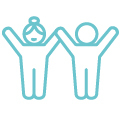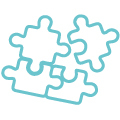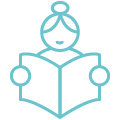Education
Strengthening access to quality education for all
In some Indian and Nepalese villages, community schools are underfunded, neglected and sometimes non-existent. Public schools, even in urban areas, remain inaccessible to children from economically disadvantaged families, creating educational inequalities.
Some figures : In India, 64% of adult women are illiterate, while in Nepal the rate is 71% (2018). Early school leaving is also a concern in both countries, affecting 50% of young people in secondary education.

Education is not only a means of improving living conditions, it is also an opportunity for an individual’s development. It is a key factor in promoting equality and autonomy. That is why at Karuna, one of our objectives is to offer everyone a chance to learn : children, young people and adults.
Our early childhood programme brings joy, encourages cooperation and promotes the healthy development of children. In the primary schools, we encourage young people to become more generous and responsible. Basic education for illiterate adults is ongoing at all our sites.
Our impact in 2023

14,300 children supported in their schooling

8,450 children in kindergarten

700 literate adults
One of our programmes in Nepal
A school built by the community
Nestled opposite the Himalayas, one of the last hamlets in the Ruby Valley, the village of Kharsa has only one dilapidated school. Despite these conditions, the motivation of the teachers is unwavering, and the children are eager to study.
Entirely built using local craftsmanship and materials, it is adapted to the region’s climatic conditions and is earthquake-resistant. The new school in Kharsa, the result of a collaboration between young French architects and our local teams, will allow the children to study in a pleasant and safe environment, conducive to the full development of their potential.
Before the school was built, the children in the region struggled to continue their education. Classes were held in cramped rooms and sometimes even in the courtyard due to the lack of space. The construction of the new school brings a sense of encouragement to the parents and children who dream of a better future.
Umesh Nakarmi, Program Coordinator in the Ruby Valley